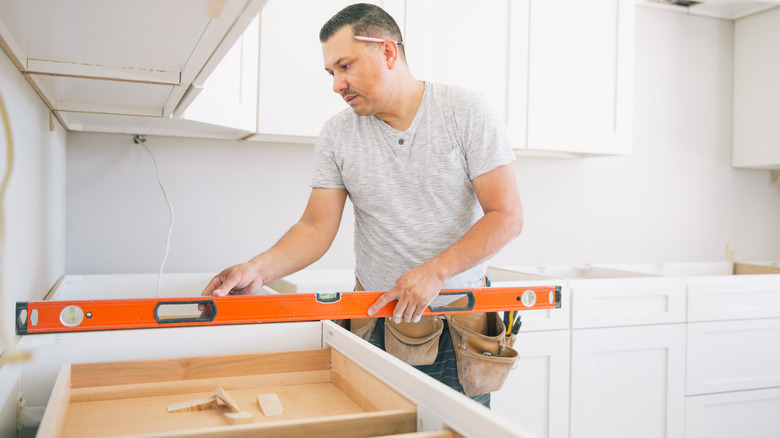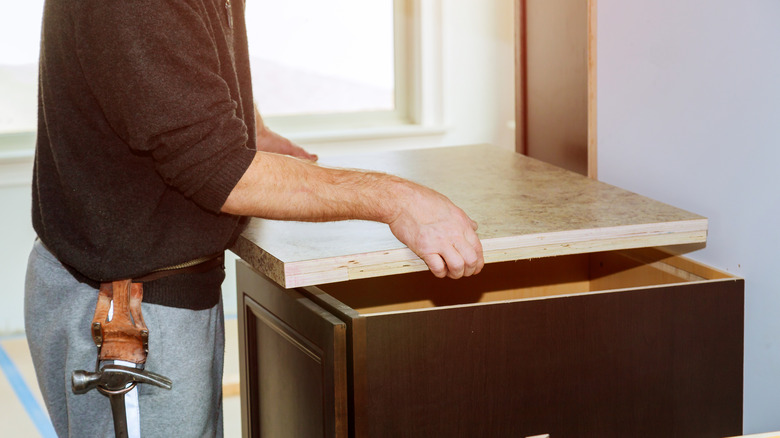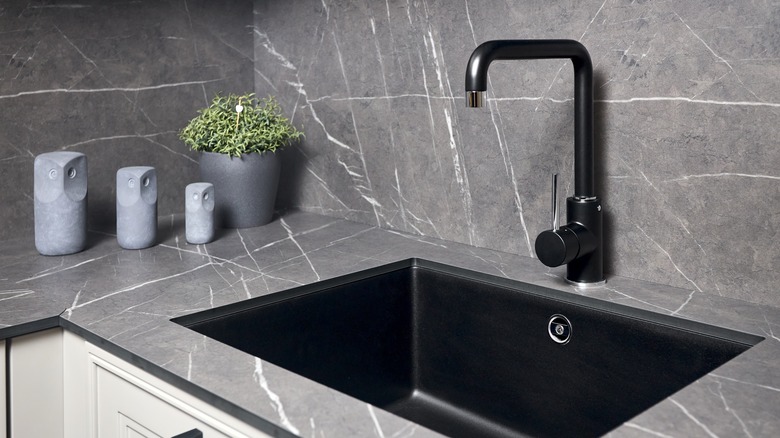This Is The Easiest Type Of Countertop To Install, But Is It Worth The Drawbacks?
From quartz to porcelain, you have a wide variety of options to choose from when it comes to countertop materials. If you are adding new countertops to your home yourself or simply want to keep labor costs low, you may want to go for the option that provides the simplest installation process. While speaking exclusively to House Digest, Irakli Khizanishvili, CEO and Owner of Proslit Tile & Stone, revealed that laminate is the easiest type of countertop material to install. But before you go out and purchase this material, you should know that it does come with a few drawbacks. All in all, Khizanishvili believes that it is still a good option for certain DIYers.
"Laminate countertops can be worth it, particularly for homeowners on a tight budget, those renovating a rental property, or those who appreciate the broad variety of styles and finishes available," he explained. "They provide a practical, cost-effective solution that is easy to maintain, and they can be a good temporary option while saving up for more premium materials." Despite the benefits of laminate countertops, Khizanishvili revealed that they are not the right fit for everyone. "If the kitchen or bathroom will see heavy use or if the property is being prepared for resale in a higher-end market, more durable options like quartz or solid surface materials may be a better investment."
How to install laminate countertops
With all this talk of how easy it is to install laminate countertops, you are probably curious about what the process actually looks like. Thankfully, Khizanishvili detailed the steps while speaking exclusively to House Digest. The installer will first need to take measurements and plan to make cuts to create room for nearby appliances. Next, the laminate should be cut to size using either a circular saw or a laminate cutter. At this point, the substrate needs to be cut as well. "Attach the particleboard or plywood substrate to the cabinetry with screws, ensuring it is level and stable," Khizanishvili explained.
Next, adhesive should be applied to the substrate and the laminate. After the adhesive becomes sticky, it is time to get the laminate into the right position and press it into the substrate with the help of a roller. Finally, the installer should trim away excess material and fill any seams. The last step is super simple. "Finish the edges with a matching laminate strip or profile, and seal any gaps to prevent moisture infiltration," Khizanishvili said of the final task.
Although this process is not all that complicated, there are still a few mistakes you need to watch out for. "Missteps in the installation process, such as improper adhesive application or uneven seams, can lead to unsatisfactory results," the expert shared. "Therefore, while it's simpler than materials like granite or quartz, some basic DIY skills or a professional touch is still recommended."
The pros and cons of laminate countertops
If you are thinking about having laminate countertops installed in your home, take a moment to consider the pros and cons of the material. As for the pros, laminate is great because it is more affordable than other options and comes in a wide variety of designs. It is also rather low maintenance. "Laminate is non-porous and doesn't require sealing, making it resistant to stains and easy to clean," Khizanishvili explained while speaking exclusively to House Digest. The material is more lightweight than other countertop materials, too. Of course, laminate also makes the installation process simple.
Now let's take a look at some of the cons described by Khizanishvili. "Laminate is more prone to scratches, burns, and chips compared to stone or solid surface materials," the expert explained. "Once damaged, it is difficult to repair." You also need to avoid heat on your laminate countertops, as it can be damaged more easily than many other countertop options. If you are looking for a material that offers longevity, laminate might not be the best option for you. "Generally, laminate does not last as long as stone or quartz countertops and may need to be replaced more frequently," Khizanishvili revealed.
The material will also not exactly boost your home's resale value. "Laminate is often considered a lower-end material, which can impact the resale value of a home compared to more premium materials," the expert went on to share. If you find that the pros of laminate countertops outweigh the cons when taking your specific needs into consideration, it might just be the right material for you.


